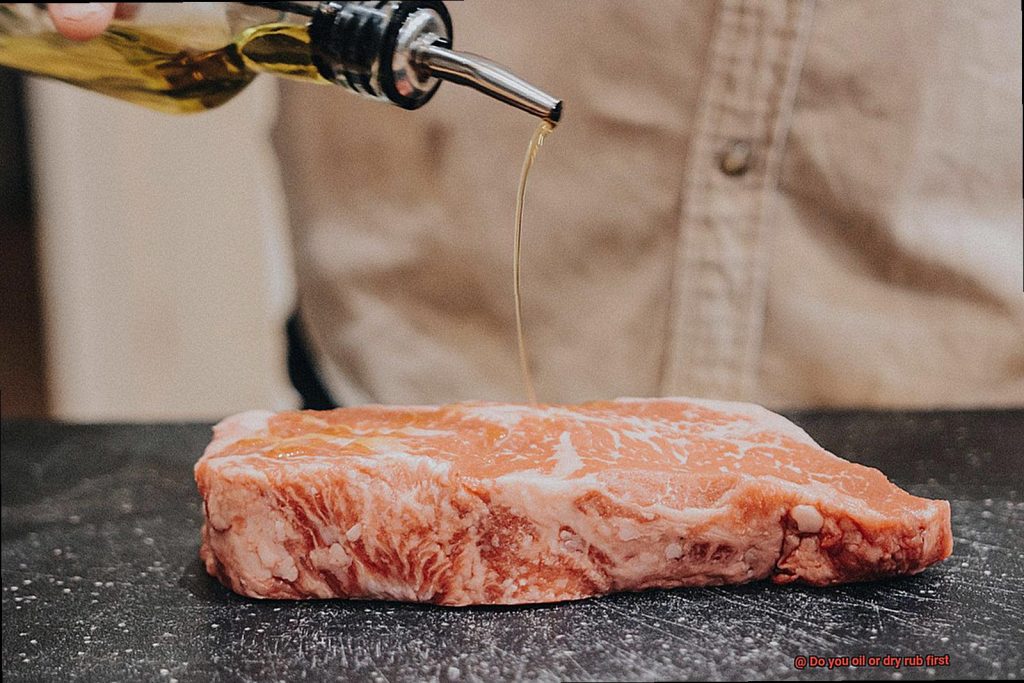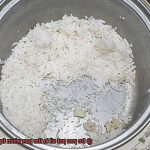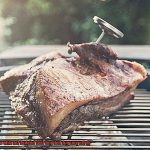As a grill master with years of experience under my belt, I’ve been asked countless times: “Do you oil or dry rub first?” It’s a question that sparks heated debates among pitmasters and BBQ enthusiasts everywhere.
At its core, the oil or dry rub first debate is all about achieving the perfect crust on your meat. Some swear by oiling their meat first, claiming it creates a barrier that locks in moisture and flavor. Others are staunch advocates for dry rubbing, which creates a crispy outer layer that seals in the meat’s juices.
But this debate isn’t just about creating the ideal crust. Oiling or dry rubbing can also impact the cooking process itself – some techniques require meat to be oiled, while others call for a dry rub first.
In this blog post, we’ll delve deeper into this age-old debate and explore the pros and cons of each method. We’ll also share tips and tricks for achieving mouth-watering meats on your grill, no matter which side of the argument you fall on.
So, grab your apron and tongs because we’re settling the score once and for all: oiling or dry rubbing first?
Contents
Benefits of Oiling First
While there are various methods, oiling first has several benefits that are worth exploring.
To begin with, oiling before seasoning ensures that the seasoning sticks to the meat properly. No one wants their seasoning to fall off during cooking. By applying a light layer of oil first, you create a barrier that helps the seasoning adhere better to the meat. This results in a flavorful crust that will have you licking your fingers in delight.
Moreover, oiling can prevent your meat from sticking to the grill grates. This is especially important when cooking delicate meats like fish and chicken. The oil acts as a shield between the meat and the grill, preventing it from sticking and tearing apart.
Another great benefit of oiling first is that it helps to keep your meat moist during cooking. As the meat cooks, the oil helps to seal in the juices, preventing it from becoming dry. This is particularly helpful when grilling leaner cuts of meat that tend to dry out quickly. By keeping your meat moist, you ensure that it stays tender and juicy.
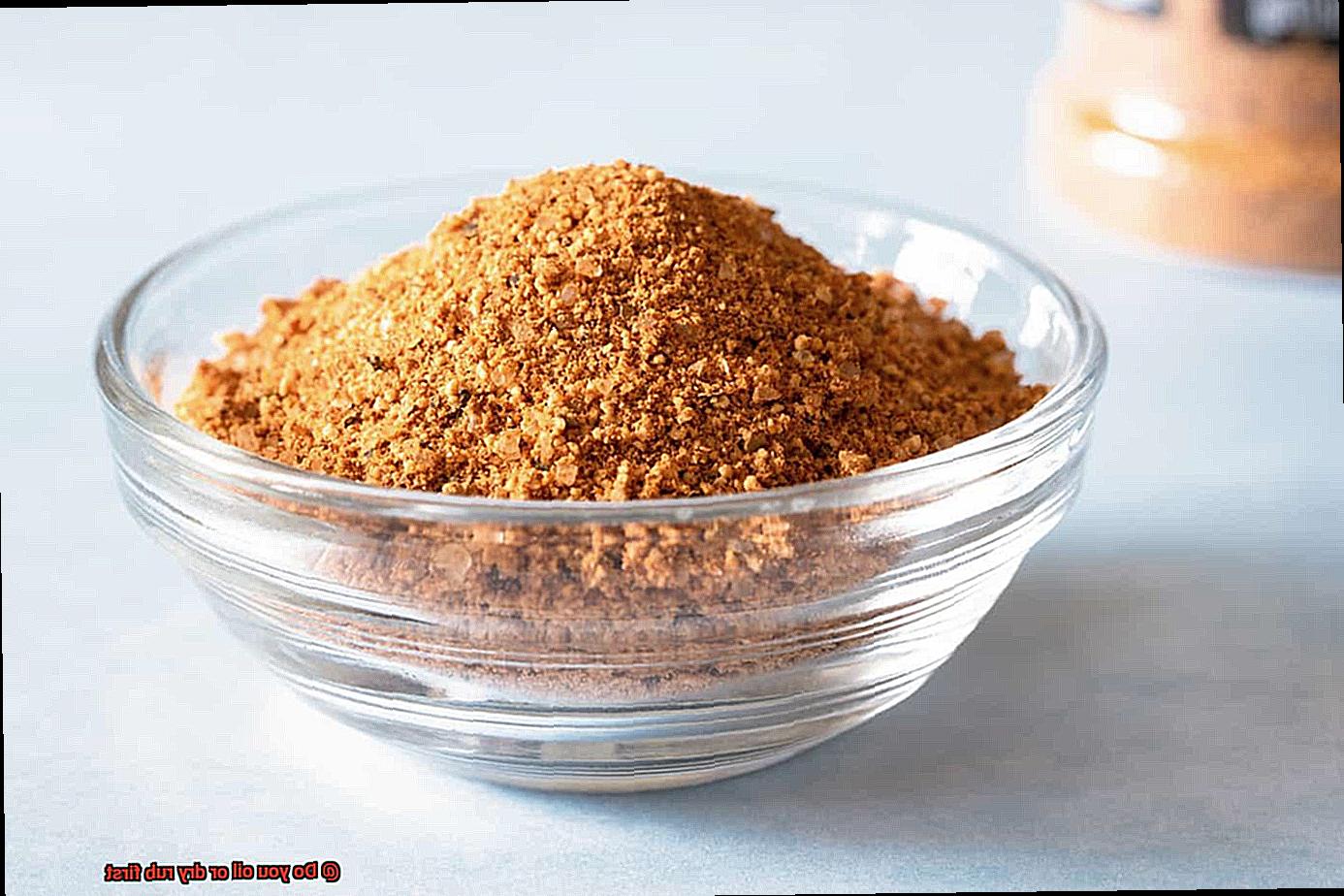
In addition, oiling your meat before seasoning can help to create a more even cook. The oil helps to conduct heat evenly across the surface of the meat, ensuring that it cooks uniformly throughout. This is especially useful when cooking thicker cuts of meat, where uneven cooking can be an issue.
It’s worth noting that not all oils are created equal when it comes to grilling. For best results, it is recommended to use high smoke point oils like vegetable or canola oil. These oils can withstand high heat without burning or smoking, which can affect the flavor of your food.
Benefits of Applying Dry Rub First
Look no further than the order in which you apply your oil and dry rub. Applying the dry rub before oil has numerous benefits that can make a significant difference in your final product.
Firstly, applying a dry rub to your meat before adding oil allows the flavors of the rub to penetrate deeper into the meat. This means every bite is packed with flavor, not just the surface. The longer the rub has to penetrate, the more flavorful and tender your meat will be.
Secondly, applying the dry rub first ensures even distribution of seasoning. When you apply oil first, it can create a barrier that prevents the dry rub from sticking to all areas of the meat. This can result in some areas being over-seasoned while others are bland. By applying the dry rub first, you can ensure that every inch of your meat is coated evenly with seasoning.
Additionally, applying a dry rub before oiling your meat can help create a better crust on the outside of your meat. The sugars and spices in the dry rub will caramelize as they cook, creating a crispy exterior that locks in moisture and flavor. Who doesn’t love a perfectly crispy and juicy piece of meat?
The Best Method for Different Types of Meats
Grilling is an art form that requires precision and technique. One crucial element to consider when grilling different types of meats is whether to use oil or a dry rub. This decision ultimately depends on the texture, thickness, and fat content of the meat.
For leaner meats like chicken breast or pork tenderloin, it’s best to oil the meat before applying a dry rub. This will keep the meat from drying out during grilling and help the dry rub to stick better. To achieve this, brush a light coating of oil onto the surface of the meat before adding the dry rub. The result will be a juicy and flavorful dish.
On the other hand, for fattier meats like ribs or brisket, it’s best to apply the dry rub first and then add a light coating of oil. The fat content in these meats is enough to keep them moist during grilling, so adding too much oil can make them greasy. By applying a dry rub first, you allow the flavors to penetrate the meat and create a delicious crust. Adding a light coating of oil on top will help achieve that perfect texture.
When it comes to seafood such as shrimp or fish, lightly oiling the surface of the meat before adding a dry rub is recommended. This not only helps prevent sticking but also adds a subtle layer of flavor to the dish.
Lastly, it’s important to remember that moderation is key when it comes to oiling or seasoning meats for grilling. Adding too much can result in an overpowering flavor or greasy texture. It’s best to experiment with different techniques and find what works best for each type of meat.
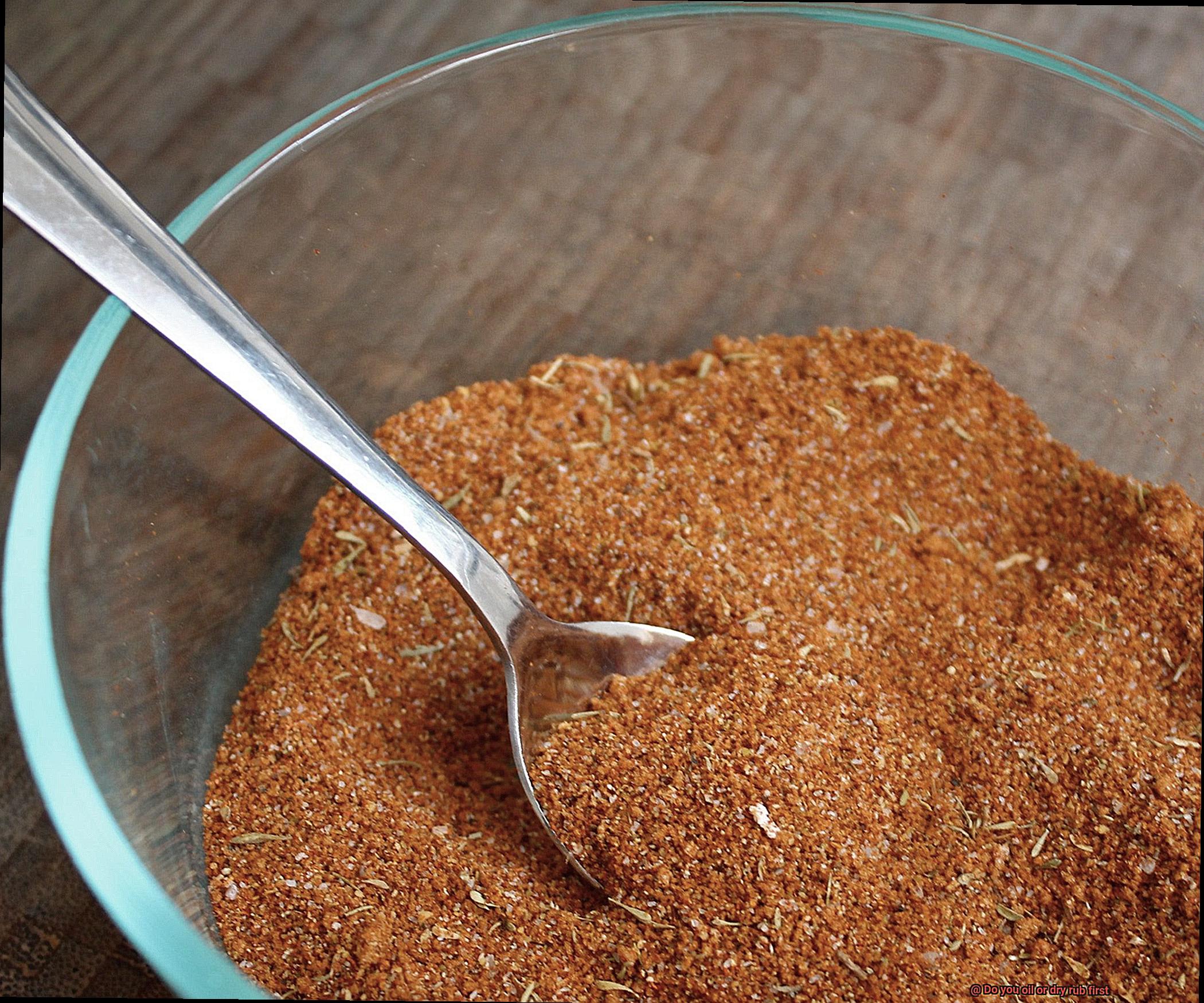
Tips on Preparing and Applying the Oil or Dry Rub
Look no further than preparing and applying the perfect oil or dry rub. Here are five tips to help you master this crucial technique:
Choose the Right Oil
The type of oil you use is key to achieving a great flavor. Opt for an oil with a high smoke point, like vegetable, canola, or grapeseed oil. These oils can withstand high temperatures without burning or smoking excessively, which can affect the flavor of your food. To add extra flavor, consider infusing your oil with herbs or spices.
Apply Oil Before Dry Rub
If you’re using both oil and a dry rub, it’s best to apply the oil first. This allows the dry rub to stick to the meat better and creates a more flavorful crust. Use a brush or your hands to evenly coat the meat with a light layer of oil before applying the dry rub.
Use Enough Dry Rub
When using a dry rub, make sure to use enough to fully coat the meat. This ensures that every bite is packed with flavor. Gently pat the rub onto the meat, making sure to cover all sides evenly. You can also use a rub shaker or spice grinder to distribute the rub more evenly.
Let it Marinate
After applying the oil and/or dry rub, let the meat marinate for at least 30 minutes before grilling. This allows the flavors to penetrate the meat and enhance its overall taste. For even better results, marinate for several hours or overnight in the refrigerator.
Don’t Overdo it
While it’s important to use enough oil and/or dry rub, it’s crucial not to overdo it. Too much of either can overpower the natural flavor of the meat and create an unpleasant taste. A general rule of thumb is to use about one tablespoon of oil and one tablespoon of dry rub per pound of meat.
How Long to Let the Oil or Dry Rub Sit Before Grilling
Fear not, my friends. This step is crucial for achieving a mouth-watering flavor and texture that will have your taste buds singing.
Let’s start with oil-based marinades or rubs. You’ll want to let them sit for at least 30 minutes before grilling, giving the flavors ample time to penetrate and tenderize the meat. However, if you’re working with a thicker cut like steak or pork chops, go ahead and let it sit for up to 24 hours to reach maximum flavor infusion.
If you’re more of a dry rub person, give it at least an hour to work its magic on the meat. This gives the spices and seasonings enough time to infuse and create a scrumptious crust. But if you’re feeling adventurous and want a bolder flavor, leave the rub on overnight.
But beware, over-marinating can lead to mushy meat. So don’t go overboard with the marinade or rub duration. And if you’re using acidic ingredients like vinegar or citrus juice in your marinade, limit it to 2-3 hours as they can break down the proteins in the meat.
In summary:
- Oil-based marinades or rubs: Let them sit for at least 30 minutes (up to 24 hours for thicker cuts).
- Dry rubs: Give them at least an hour (overnight for more intense flavor).
- Don’t over-marinate.
- Limit acidic ingredients to 2-3 hours.
Pros and Cons of Oiling vs. Dry Rubbing First
Each method has its own set of advantages and disadvantages, and it ultimately boils down to personal preference and the type of meat you’re working with.
Oiling your meat before applying the dry rub has several benefits. Firstly, it helps the seasonings stick better to the surface of your meat, resulting in more flavor and an evenly seasoned end product.
Additionally, it can prevent sticking to the grill grates, making turning and flipping easier. However, be wary of using too much oil as it can create a barrier between your meat and the heat source, preventing that sought-after sear and crust from forming. Nobody wants their perfectly cooked meat to be greasy or oily.
On the other hand, dry rubbing first allows for direct contact between your meat and the grill grates, resulting in a delicious sear and crust. You have complete control over the amount of seasoning you use, allowing you to adjust to your taste preferences.
However, using only a dry rub can lead to uneven seasoning if it doesn’t adhere well to the meat without any moisture present. Additionally, not using enough oil or another lubricant can result in meat sticking to the grill grates.
When it comes down to it, choosing between oiling and dry rubbing first is a matter of personal preference and experimentation. Try both methods and see what works best for you and your specific grilling situation. Certain meats or cuts may even work better with one method over the other.
How to Achieve Maximum Flavor with Both Methods
Grilling is an art, and achieving maximum flavor is the ultimate goal. Choosing between oiling and dry rubbing can be a daunting task. But fear not, with the right ingredients and techniques, both methods can produce mouth-watering results.
The Choice Between Oiling and Dry Rubbing
Choosing between oiling and dry rubbing depends on personal preference and the type of meat being cooked. Oiling provides a crispy exterior while keeping the meat moist on the inside, making it ideal for lean meats such as chicken breasts, pork chops, or fish fillets. Dry rubbing, on the other hand, allows the flavors of herbs and spices to infuse into the meat, creating a rich, complex flavor profile. It works well with fattier cuts such as ribs or brisket.
High-Quality Ingredients are Key
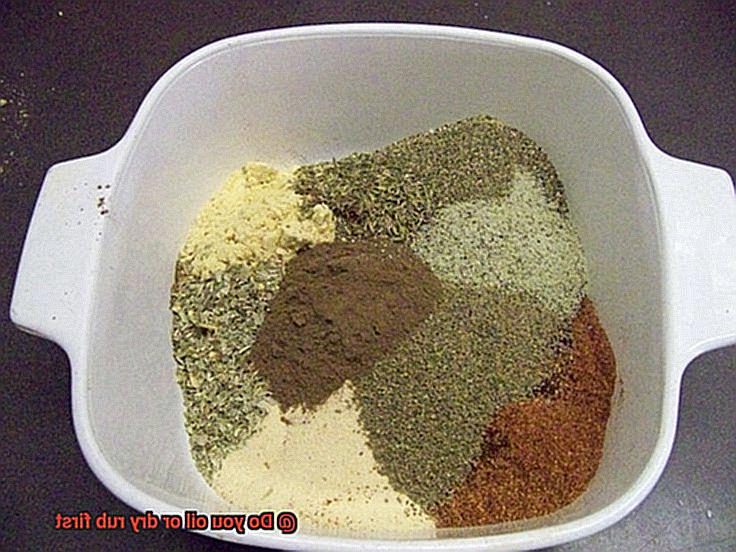
Using high-quality ingredients is crucial for maximum flavor. Using fresh herbs and spices and high-quality oils will ensure that your meat is bursting with flavor. It’s important to invest in good quality seasonings that complement your meat.
Techniques for Maximum Flavor
Massaging the dry rub into the meat is essential to ensure that all parts are evenly coated with seasoning. When using oil before applying a dry rub, it helps create a crust on the outside of the meat, adding texture and flavor. Marinating your meat for at least 30 minutes before grilling will allow the flavors to penetrate deeper into the meat.
Choose Your Oil Wisely
It’s important to choose oils with high smoke points such as vegetable or canola oil when using oil as a binder for dry rubs. Oils with low smoke points like olive oil can burn quickly at high temperatures, leaving an unpleasant taste.
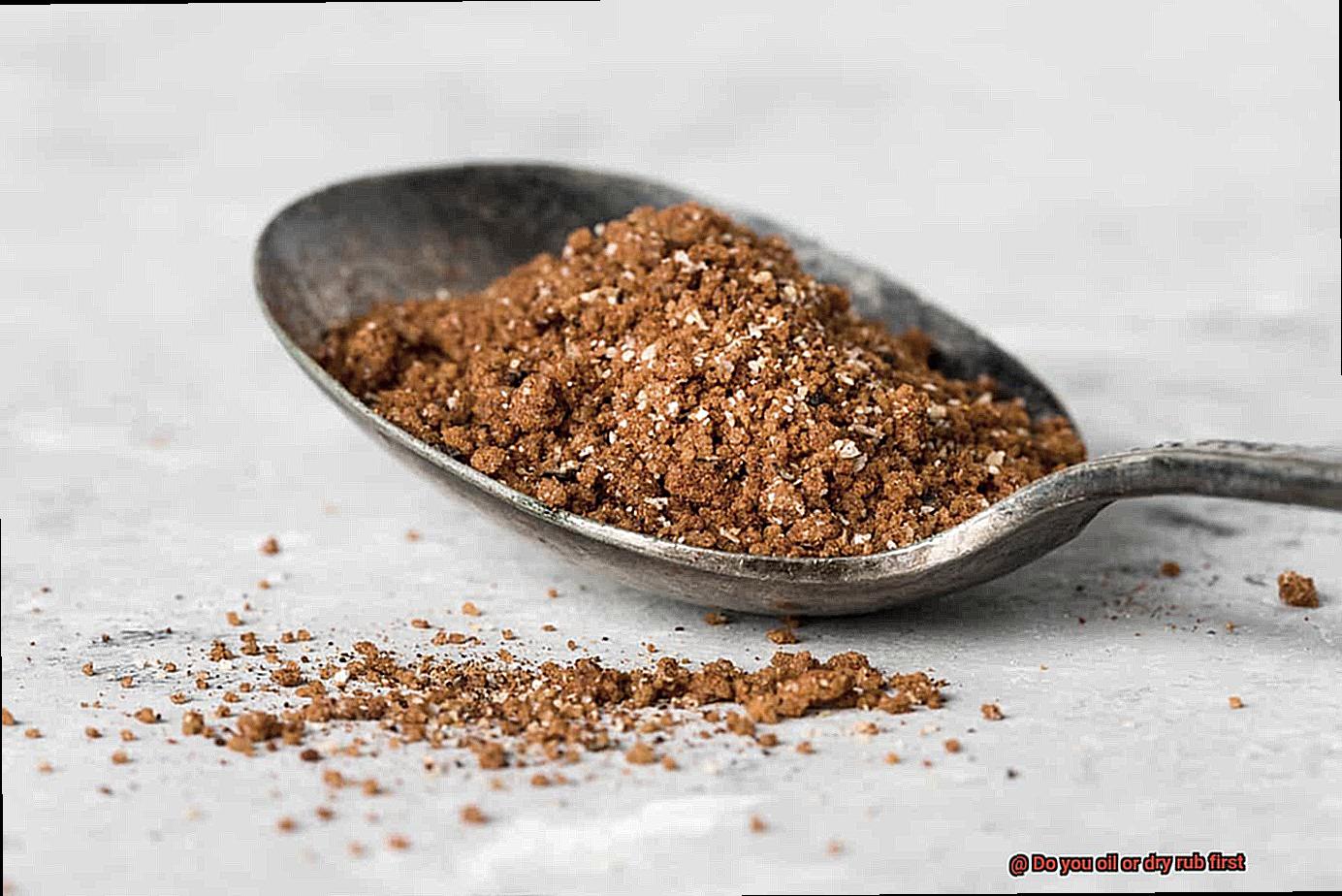
Experiment with Both Methods
Experimenting with both methods can help you find your perfect flavor profile for each type of meat. Using oil before applying a dry rub can enhance flavors even more and create a crispy exterior.
Common Mistakes to Avoid When Applying Oil or Dry Rubs
Grilling is a fantastic way to enjoy delicious and flavorful meals, but it can be daunting to apply oil or dry rubs. As an expert, I’ve seen many people make the same mistakes when applying these seasonings. Here are some tips to help you avoid common mistakes and perfect your grilling game.
Firstly, remember that less is more when it comes to oil and dry rubs. Applying too much can lead to overpowering flavors or a greasy texture. To ensure even coating, use a brush or paper towel to apply a thin layer of oil on the meat. For dry rubs, sprinkle a small amount onto the meat and then massage it in with your hands.
Timing is everything when it comes to applying oil or dry rubs. Applying oil too early can cause it to drip off the meat before it even hits the grill, while applying it too late can result in unevenly cooked meat.
With dry rubs, applying them too early can cause the meat to become dry and tough, while applying them too late can result in clumps of seasoning that don’t evenly distribute. To avoid these issues, apply your seasoning just before grilling.
Another mistake to avoid is using low-quality oils or pre-made seasoning blends that contain a lot of salt or other fillers. These can negatively impact the flavor and texture of your food. Instead, opt for high-quality oils such as extra-virgin olive oil or avocado oil. Making your own dry rubs using fresh herbs and spices ensures that you have full control over the flavor.
Lastly, don’t forget to give your seasoning enough time to penetrate the meat fully. Letting the meat sit with the seasoning on for at least 30 minutes before grilling allows the flavors to develop fully and ensures juicy, flavorful meat.
5N24eBYv6uA” >
Conclusion
In conclusion, the age-old debate of whether to oil or dry rub first when grilling meat has been a topic of discussion for years. Although both techniques have their benefits and drawbacks, it ultimately comes down to personal preference and the type of meat you’re cooking.
If you opt for oiling before seasoning, you can expect better seasoning adhesion, less sticking to grill grates, moist meat during cooking, and even cooking. Conversely, applying a dry rub before oiling allows for more profound flavor penetration, even seasoning distribution, and a crispier crust on the outside.
To achieve maximum flavor with either method, using high-quality ingredients such as fresh herbs and spices and oils with high smoke points is critical. Techniques like massaging in dry rubs and letting meat marinate before grilling can also enhance flavor. However, overdoing it with either oil or seasoning is a common pitfall that can ruin your dish.
Avoid mistakes like applying too much oil or seasoning, timing issues with application, using low-quality oils or pre-made blends with fillers while ensuring enough time for seasoning to penetrate fully.
In summary, experimenting with both methods can help find the perfect flavor profile for each type of meat while avoiding common mistakes leads to mouth-watering results on your grill.

